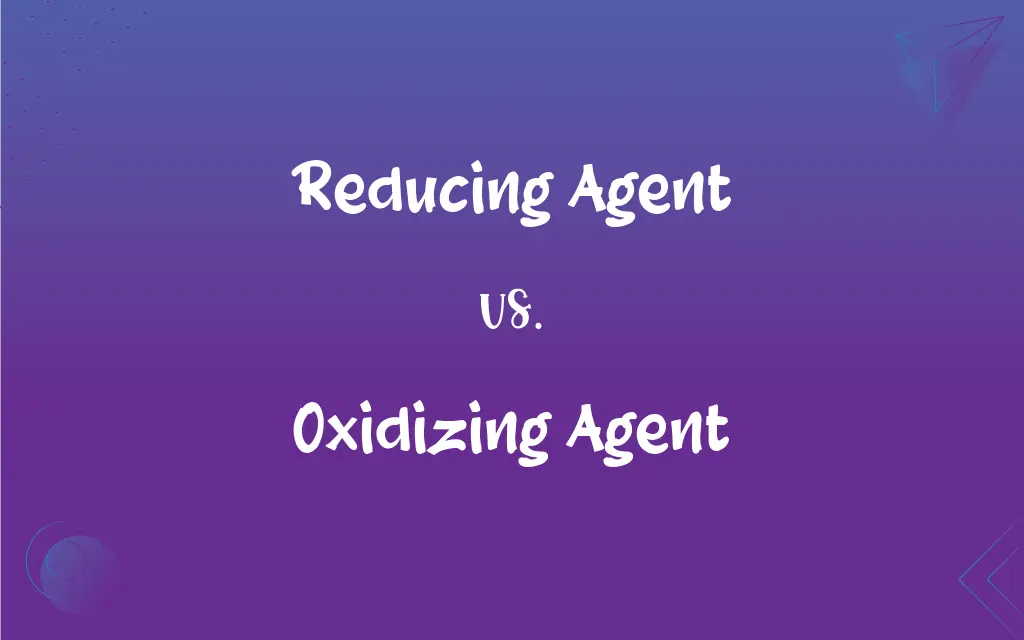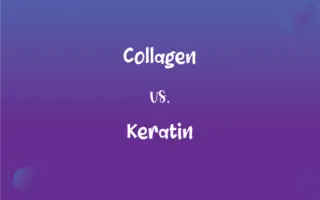Reducing Agent vs. Oxidizing Agent: What's the Difference?
Edited by Janet White || By Harlon Moss || Published on November 29, 2023
Reducing agents donate electrons and get oxidized, while oxidizing agents accept electrons and get reduced in chemical reactions.

Key Differences
A reducing agent is a substance that donates electrons to another species in a chemical reaction, causing itself to be oxidized. It essentially reduces the oxidation state of the other substance. For instance, in metal ore processing, carbon acts as a reducing agent to extract metal. An oxidizing agent, in contrast, accepts electrons, becoming reduced itself. This agent increases the oxidation state of the other substance, like oxygen in combustion reactions.
In terms of electron transfer, reducing agents lose electrons and gain a higher oxidation state. They are often metals or have a surplus of electrons, ready to donate. Oxidizing agents, on the other hand, gain electrons and lower their oxidation state. They are typically non-metals or electron-deficient substances, capable of accepting electrons easily.
Reducing agents play a crucial role in energy production, like glucose in cellular respiration, where it donates electrons, fueling the energy-producing process. Oxidizing agents are essential in processes that require the removal of electrons, such as in bleaching and disinfection, where substances like chlorine act as oxidizers.
In corrosion, a reducing agent (often a metal) loses electrons and corrodes, like iron rusting. Oxidizing agents in this context, such as oxygen or water, facilitate this electron loss, leading to the corrosion of the reducing agent. This interplay is fundamental in electrochemistry and corrosion science.
In biological systems, reducing agents are vital for synthesizing complex molecules, aiding in processes like photosynthesis and DNA replication. Conversely, oxidizing agents in biology are used in energy release and defensive mechanisms, like the immune response where they help destroy pathogens.
ADVERTISEMENT
Comparison Chart
Electron Transfer
Donates electrons
Accepts electrons
Oxidation State Change
Gets oxidized (increased oxidation state)
Gets reduced (decreased oxidation state)
Typical Examples
Metals, hydrogen
Oxygen, chlorine
Role in Reactions
Reduces other substances
Oxidizes other substances
Common Uses
Energy production, metal extraction
Disinfection, bleaching, combustion
ADVERTISEMENT
Reducing Agent and Oxidizing Agent Definitions
Reducing Agent
Crucial in biological energy processes.
Glucose is a reducing agent in cellular respiration.
Oxidizing Agent
Essential in antimicrobial processes.
Hydrogen peroxide is an oxidizing agent used for sterilization.
Reducing Agent
Helps extract metals from ores.
Carbon is used as a reducing agent in smelting iron.
Oxidizing Agent
Accepts electrons in chemical reactions.
Oxygen often acts as an oxidizing agent in combustion.
Reducing Agent
Donates electrons in reactions.
Hydrogen gas acts as a reducing agent in many chemical reactions.
Oxidizing Agent
Increases oxidation states of other substances.
Chlorine is a strong oxidizing agent used in water treatment.
Reducing Agent
Lowers oxidation states of other substances.
In the blast furnace, carbon monoxide is the reducing agent for iron ore.
Oxidizing Agent
Itself becomes reduced during the reaction.
In redox reactions, potassium permanganate acts as an oxidizing agent and gets reduced.
Reducing Agent
Itself becomes oxidized during reactions.
Zinc metal serves as a reducing agent and gets oxidized to zinc ions.
Oxidizing Agent
Common in bleaching and cleaning agents.
Bleach contains sodium hypochlorite, an effective oxidizing agent.
FAQs
What's the role of an oxidizing agent in combustion?
It gains electrons, facilitating the burning process.
How does a reducing agent work?
It loses electrons and increases its oxidation state.
What are common reducing agents?
Hydrogen, carbon, and metals like zinc.
What are typical oxidizing agents?
Oxygen, chlorine, and potassium permanganate.
What is a reducing agent?
A substance that donates electrons to another in a reaction.
What is an oxidizing agent?
A substance that accepts electrons from another in a reaction.
Can a substance be both a reducing and oxidizing agent?
Yes, in different reactions, a substance can act as both.
How do oxidizing agents disinfect?
They remove electrons from pathogens, destroying them.
How do oxidizing agents aid in bleaching?
They break down color-causing compounds by gaining electrons.
Why are reducing agents important in metal extraction?
They donate electrons to metal ions, reducing them to pure metal.
Are reducing agents always metals?
Not always, but many are metals or electron-rich compounds.
How are reducing agents used in industrial processes?
They're used in processes like steel making and chemical synthesis.
Do all oxidizing agents release oxygen?
Not all; some work by accepting electrons without involving oxygen.
What safety precautions are needed for oxidizing agents?
Proper handling and storage to prevent accidental reactions.
What happens to a reducing agent in a chemical reaction?
It becomes oxidized by losing electrons.
What's the role of oxidizing agents in the immune system?
They help destroy pathogens through oxidative stress.
Are oxidizing agents harmful to humans?
In high concentrations, they can be harmful or corrosive.
Can oxidizing agents cause corrosion?
Yes, by accepting electrons and promoting rust in metals.
How do reducing agents affect redox reactions?
They drive the reaction by donating electrons.
What is an example of a biological reducing agent?
Glucose in cellular respiration.
About Author
Written by
Harlon MossHarlon is a seasoned quality moderator and accomplished content writer for Difference Wiki. An alumnus of the prestigious University of California, he earned his degree in Computer Science. Leveraging his academic background, Harlon brings a meticulous and informed perspective to his work, ensuring content accuracy and excellence.
Edited by
Janet WhiteJanet White has been an esteemed writer and blogger for Difference Wiki. Holding a Master's degree in Science and Medical Journalism from the prestigious Boston University, she has consistently demonstrated her expertise and passion for her field. When she's not immersed in her work, Janet relishes her time exercising, delving into a good book, and cherishing moments with friends and family.






































































